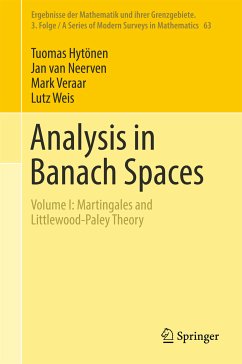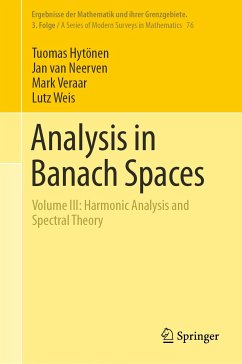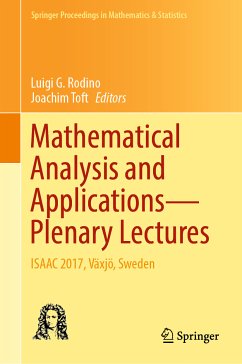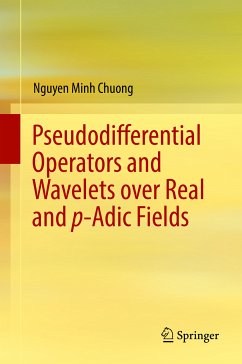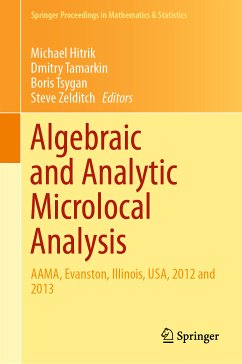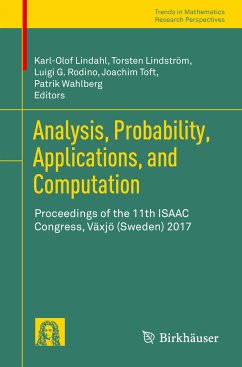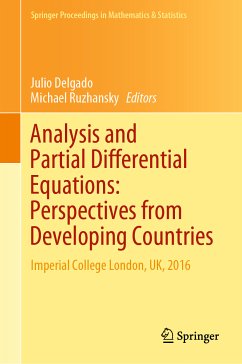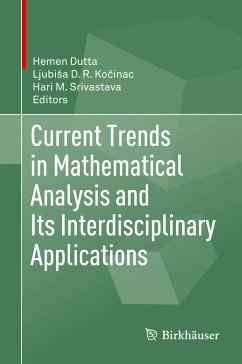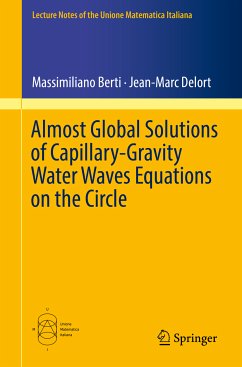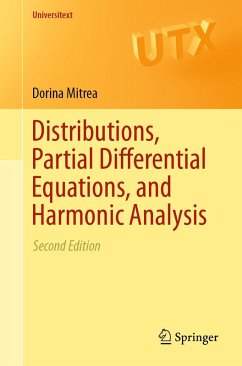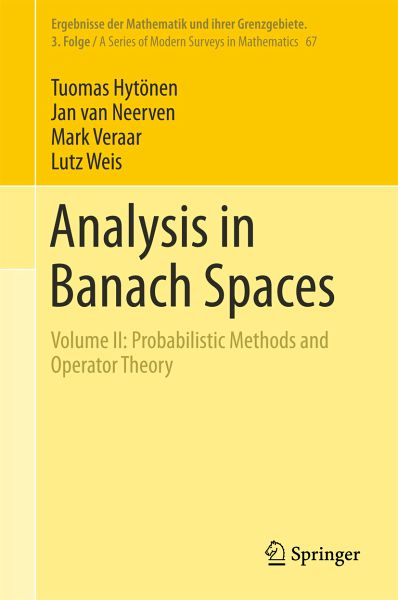
Analysis in Banach Spaces (eBook, PDF)
Volume II: Probabilistic Methods and Operator Theory

PAYBACK Punkte
68 °P sammeln!






Presents a thorough study of the basic randomisation techniques and the operator-theoretic aspects of the theory.
Dieser Download kann aus rechtlichen Gründen nur mit Rechnungsadresse in A, B, BG, CY, CZ, D, DK, EW, E, FIN, F, GR, HR, H, IRL, I, LT, L, LR, M, NL, PL, P, R, S, SLO, SK ausgeliefert werden.
Tuomas Hytönen is Professor at the University of Helsinki. A leading expert in Harmonic Analysis with over 60 research papers, he was educated at Helsinki University of Technology and spent a postdoc year at Delft University of Technology. He received a European Research Council Starting Grant in 2011 and gave an invited address to the International Congress of Mathematicians in 2014.
Jan van Neerven is Professor of Analysis at Delft University of Technology. Author of more than 100 research papers and two monographs, he is a leading expert in Operator Theory and Stochastic Analysis. He held post-doctoral positions at Caltech and Tübingen University. He was awarded a Human Capital and Mobility fellowship, a fellowship of the Royal Dutch Academy of Arts and Sciences, and VIDI and VICI subsidies from the Netherlands Organisation for Scientific Research.
Mark Veraar is Associate Professor at Delft University of Technology. Author of over 40 research papers, he is a leadingresearcher in the theory of evolution equations and stochastic partial differential equations. He held post-doctoral positions at the Universities of Warsaw and Karlsruhe, the latter with a Alexander von Humboldt Fellowship. He is the recipient of VENI and VIDI grants from the Netherlands Organisation for Scientific Research.
Lutz Weis, a Professor at Karlsruhe Institute of Technology, is a senior researcher in operator theory and evolution equations. He has published over 80 research papers and a monograph. Since receiving his PhD from University of Bonn, he was a professor at Louisiana State University and visiting professor at TU Berlin as well as Universities of Kiel, South Carolina and Minnesota. He organized a Marie Curie training site and is currently a member of a DFG Graduiertenkolleg.
Jan van Neerven is Professor of Analysis at Delft University of Technology. Author of more than 100 research papers and two monographs, he is a leading expert in Operator Theory and Stochastic Analysis. He held post-doctoral positions at Caltech and Tübingen University. He was awarded a Human Capital and Mobility fellowship, a fellowship of the Royal Dutch Academy of Arts and Sciences, and VIDI and VICI subsidies from the Netherlands Organisation for Scientific Research.
Mark Veraar is Associate Professor at Delft University of Technology. Author of over 40 research papers, he is a leadingresearcher in the theory of evolution equations and stochastic partial differential equations. He held post-doctoral positions at the Universities of Warsaw and Karlsruhe, the latter with a Alexander von Humboldt Fellowship. He is the recipient of VENI and VIDI grants from the Netherlands Organisation for Scientific Research.
Lutz Weis, a Professor at Karlsruhe Institute of Technology, is a senior researcher in operator theory and evolution equations. He has published over 80 research papers and a monograph. Since receiving his PhD from University of Bonn, he was a professor at Louisiana State University and visiting professor at TU Berlin as well as Universities of Kiel, South Carolina and Minnesota. He organized a Marie Curie training site and is currently a member of a DFG Graduiertenkolleg.
Produktdetails
- Verlag: Springer International Publishing
- Seitenzahl: 616
- Erscheinungstermin: 14. Februar 2018
- Englisch
- ISBN-13: 9783319698083
- Artikelnr.: 53064150
"The book can be used not only as a reference book but also as a basis for advanced courses in vector-valued analysis and geometry of Banach spaces. This monograph can be studied for different motivations, it clearly goes straight to the core and introduces only those concepts that will be needed later on, but makes detailed proofs, so it can be used as a textbook for students or as a book for researchers ... ." (Oscar Blasco, zbMATH, Vol. 1366.46001, 2017)
The authors thus select a representative set of topics, and present each of them in the thorough and highly readable style . Anyone primarily trained in functional analysis is extremely likely to enjoy the Analysis in Banach spaces series. For these readers, the series provides a highly readable and completely self-contained entry point into many other Fields, especially harmonic and stochastic analysis. (Pierre Portal, Mathematical Reviews, January, 2025)
The authors always cover the necessary prerequisites from earlier developments and the book is meant to be self-contained. ... The volume ends with an interesting list of open problems and an appendix containing a section on measurable semigroups and another one on the trace method for real interpolation. (Oscar Blasco, zbMATH 1534.46003, 2024)
The authors always cover the necessary prerequisites from earlier developments and the book is meant to be self-contained. ... The volume ends with an interesting list of open problems and an appendix containing a section on measurable semigroups and another one on the trace method for real interpolation. (Oscar Blasco, zbMATH 1534.46003, 2024)
Für dieses Produkt wurde noch keine Bewertung abgegeben. Wir würden uns sehr freuen, wenn du die erste Bewertung schreibst!
Eine Bewertung schreiben
Eine Bewertung schreiben
Andere Kunden interessierten sich für


